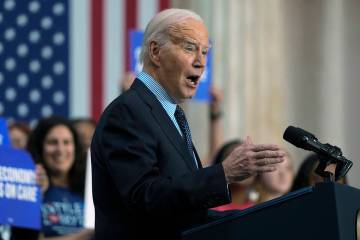EDITORIAL: Trump appointee reins in Consumer Financial Protection Bureau
In the wake of the Great Recession, congressional Democrats saw their opening to create yet another federal agency, because apparently there weren’t enough bureaucrats already meddling in every aspect of our lives. It would be called the Consumer Financial Protection Bureau. Who could argue against protecting consumers?
This bureau would be structured differently from others. It would operate completely independent of congressional or executive branch oversight and would have just one person at the top as director, able to act unilaterally.
In other words, there would be zero accountability to anyone, checks and balances be damned.
With President Barack Obama in the White House, this idea sounded wonderful to Democrats, especially to Sen. Elizabeth Warren, D-Mass., who is credited with designing the bureau model.
My, how things have changed. With a Republican holding the Oval Office, Sen. Warren and Co. suddenly aren’t happy that their creation is no longer being used as a blunt instrument to shake down banks and other financial institutions.
As the Washington Examiner’s Joseph Lawler reported earlier this month, Sen. Warren isn’t happy with how acting CFPB director Mick Mulvaney is exercising his wide discretion. “If you don’t like it, talk to the person who wrote the statute,” Mr. Mulvaney said. “Because all I’m doing is the role you laid out.” Touche.
Mr. Mulvaney hasn’t been afraid to voice his skepticism about the agency’s extraordinary powers and massive overreach. Neither has the judiciary. A panel of the U.S. Court of Appeals for the District of Columbia found the CFPB’s leadership structure to be unconstitutional, although that ruling was later overturned by the court sitting en banc. The issue is headed for the Supreme Court.
Further, National Review pointed out that the bureau had to reverse itself when previous director Richard Cordray, with no legal authority, unilaterally increased the fine in a mortgage insurance case from $6 million to a whopping $103 million. “A federal bureaucrat who can levy hundreds of millions of dollars in fines on his own authority while immune from ordinary executive-branch accountability and enjoying wide-ranging jurisdiction across the financial industry is positioned to become an extortion artist of the first rank,” the magazine noted.
And what was done with such extortion proceeds? A report from the Competitive Enterprise Institute found that the CFPB was using revenue generated by fines to award cash almost exclusively to liberal, Democratic groups. Mr. Mulvaney now has that fund under strict review.
Mr. Mulvaney also found that the agency had reserve cash under Mr. Cordray’s direction to the tune of $177.1 million at the beginning of fiscal 2018. So in January, with projected second-quarter expenses of $145 million, Mr. Mulvaney declined any new federal money, opting to pay second-quarter expenses from the reserve fund.
Bravo. The agency’s structure is unconstitutional at its core.




























